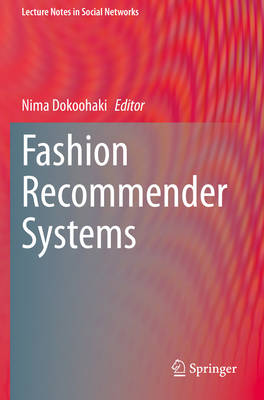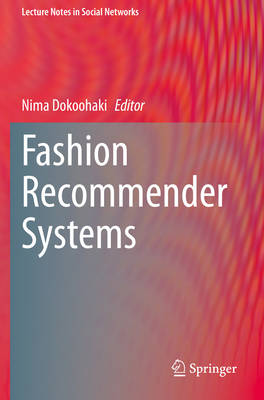
- Retrait gratuit dans votre magasin Club
- 7.000.000 titres dans notre catalogue
- Payer en toute sécurité
- Toujours un magasin près de chez vous
- Retrait gratuit dans votre magasin Club
- 7.000.000 titres dans notre catalogue
- Payer en toute sécurité
- Toujours un magasin près de chez vous
Fashion Recommender Systems
Description
This book includes the proceedings of the first workshop on Recommender Systems in Fashion 2019. It presents a state of the art view of the advancements within the field of recommendation systems with focused application to e-commerce, retail and fashion. The volume covers contributions from academic as well as industrial researchers active within this emerging new field.
Recommender Systems are often used to solve different complex problems in this scenario, such as social fashion-based recommendations (outfits inspired by influencers), product recommendations, or size and fit recommendations.
The impact of social networks and the influence that fashion influencers have on the choices people make for shopping is undeniable. For instance, many people use Instagram to learn about fashion trends from top influencers, which helps them to buy similar or even exact outfits from the tagged brands in the post. When traced, customers' social behavior can be avery useful guide for online shopping websites, providing insights on the styles the customers are really interested in, and hence aiding the online shops in offering better recommendations and facilitating customers quest for outfits.
Another well known difficulty with recommendation of similar items is the large quantities of clothing items which can be considered similar, but belong to different brands. Relying only on implicit customer behavioral data will not be sufficient in the coming future to distinguish between for recommendation that will lead to an item being purchased and kept, vs. a recommendation that might result in either the customer not following it, or eventually return the item.
Finding the right size and fit for clothes is one of the major factors not only impacting customers purchase decision, but also their satisfaction from e-commerce fashion platforms. Moreover, fashion articles have important sizing variations. Finally, customer preferences towards perceived article size and fit for their body remain highly personal and subjective which influences the definition of the right size for each customer.
The combination of the above factors leaves the customers alone to face a highly challenging problem of determining the right size and fit during their purchase journey, which in turn has resulted in having more than one third of apparel returns to be caused by not ordering the right article size. This challenge presents a huge opportunity for research in intelligent size and fit recommendation systems and machine learning solutions with direct impact on both customer satisfaction and business profitability.
Spécifications
Parties prenantes
- Editeur:
Contenu
- Nombre de pages :
- 145
- Langue:
- Anglais
- Collection :
Caractéristiques
- EAN:
- 9783030552206
- Date de parution :
- 06-11-21
- Format:
- Livre broché
- Format numérique:
- Trade paperback (VS)
- Dimensions :
- 155 mm x 235 mm
- Poids :
- 300 g






